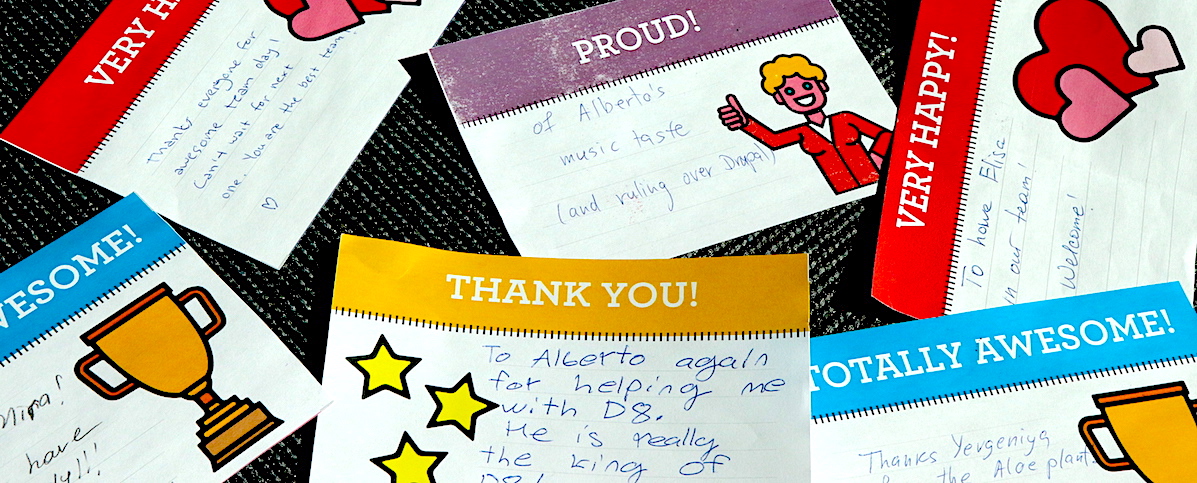Different ways of giving feedback to your colleagues
I love giving compliments when I notice that somebody has done an outstandingly good job. It makes me happy to help make someone’s day. Giving is one of the best ways to feel some sort of greater purpose than that of your mundane tasks. I want to share some useful ways of giving feedback to your colleagues.
We all deserve to hear some positive feedback occasionally. People have their ups and downs, their good days and their not-so-good days. Positive feedback could cheer you up in the right moment, right when you are feeling a little bit too stressed and a little bit low on motivation.
It took me many years to realize I felt awkward receiving compliments. I have noticed that many other people around me were also feeling awkward when they got compliments. What really changed my point of view on receiving compliments is how the one who gives them feels.
Imagine for example that you spent a while choosing the right birthday present for your mom. Let’s say you bought her a nice book, since you know she always loves those. You get her a card as well and write: “Happy birthday to the best mom in the world!”. Now, imagine if your mother would then say “The best mom? What’s best about me? I am really not that special.” and then adds “You really shouldn’t have bought me that book, it’s really expensive.”
Fortunately nobody has said that to me but I have said that to others in the past when I was feeling awkward. I would imagine that getting a response like that depreciates the value of both the gift and the compliment. How about a simple “Thank you!” and a smile? It’s not hard to do that, right?
A compliment, when well deserved, could make you see the light at the end of the tunnel again and give you the strength for that final lap that you need to complete to get something done.
Giving feedback at work
At this point I hope we are on the same page: knowing how to give and receive feedback is important. It is important to have it in your mindset. It is good, now and then, to take a look and really notice how the people around you are contributing to the overall spirit and environment. Here are a few tips for giving feedback to your colleagues.
Kudos cards
In my team we have a “Kudos box” and some papers with cheerful colors and pre-written text like “Thank you”, “Good job”, “Well done”, “Proud of you”, etc. Those papers are called Kudos cards. There are blank lines on the Kudos cards where people can write a freeform message to someone else in the team, and then they place the card in the Kudos box. The Kudos box is opened once every few weeks and all team members read the Kudos cards together.
People write all kinds of random things on those. Some of the Kudos cards focus on technical things. Quite a few of them are a thank you note to our senior developer Alberto, who is great with Drupal CMS.
Other Kudos cards focus on non-work-related things, for example thanking someone for the cookies that they baked, or thanking someone for a plant that they brought to work. Some Kudos cards are then focused more and more on inside jokes within the team. That just makes them even greater and funnier to read.
Kudos cards are not only a way to give compliments to people but also a way to build a team culture. We actually get to know a bit more about our colleagues in that process.
Quick rewards
We have a company-wide way of praising someone. During staff meetings, which normally happen once every two weeks, we have a chance to give quick rewards to our colleagues. In recent times the quick rewards have been a few sports and culture vouchers. In addition to being able to go to the movie theatre for free, for example, the colleague that receives the quick reward gets some praise in front of the whole staff.
Now, the first reaction of many people would be that this would be a bit awkward. Accepting the compliment just makes it better for the one who gives the compliment. Being mindful of your colleagues helps.
Having a short dedicated section during each of our staff meetings, just for the quick rewards to be given out, encourages people to take the initiative to reward a colleague. It changes the mindset: it is not that awkward to give or receive awards. Instead, it would be more awkward if nobody did. In a sense, quick rewards have become a part of Exove’s company culture.
Code reviews
As is probably the practice in most IT companies, at Exove we do code reviews. This is a great way to get practical feedback from another colleague on the code that you write. Naturally this feedback is mostly constructive instead of “praise” but for people who appreciate learning and who want to take all possible chances to improve, it works wonders. Surely the colleague who reviews the code needs to keep common considerations in mind.
The same type of feedback can be delivered in a totally positive and a totally negative way, depending on how you phrase your sentences. The way you perceive feedback also plays an important role. Check out the blog post by my friend Yevgeniya, which talks more about that aspect.
You can really go out of your way and comment on the good things in the code too! For example someone may have come up with a really nice solution to something. Or perhaps they documented (commented) their code very well. It is good to point out the things that really work well and stand out.
Annual Christmas-time awards
Every year near Christmas, the management at Exove decides who would get awards (think of them as sort of “certificates”) in certain categories.
Last year, the categories for the awards were Exove’s values, some broken down into more specific terms. The annual awards are delivered during a staff meeting and it is a great way to recognise people’s exceptional efforts throughout the past year.
Monthly meetings with competence manager
The non-management staff at Exove has monthly meetings with their direct supervisor, who is normally a technical competence manager. During those meetings we get to discuss about any blockers, or just general topics that are on our minds.
If you need to address something, that is a great time and place to get advice.
360-degree feedback
Once a year we get asked to officially provide feedback to colleagues that we have worked with. People get to praise the good parts in someone’s work, and to provide suggestions and ideas for further growth of that person. The written feedback is then checked during each person’s development discussion.
We at Exove treat each other as friends, and so typically the feedback contains a lot of positive points, carefully selected to help each person recognise and appreciate their own strengths. People are not hesitant to point out your good qualities and the things that you do really well.
Demos and continuous training days
We organize short internal demos about twice a month. The idea is to share with our colleagues about some new topic that has popped up during our work, or perhaps to showcase something cool that we have done. This is all part of the experimental culture that we have at Exove.
The attendees get to see new things and the presenter gets feedback about the presentation in general, and perhaps some ideas that would help them further with their ongoing work on that topic.
A similar teaching and feedback process happens during our continuous training days, where we teach and learn from colleagues.
Team meetings
Each of our teams is more or less free to decide their agenda on team-related activities. Some choose to have weekly meetings, whereas others prefer to have daily meetings.
In my team we sometimes discuss project resourcing, and we usually have freeform discussions about things that have happened recently. It’s a great way to share knowledge within the team and to build a sense of team spirit.
The team meeting is also the time when we open the Kudos box, described earlier. Oh, and we sometimes eat “pulla” and have coffee along with the other things on the agenda during the weekly.
GPTW survey
Exove has, for quite a few years now, participated in the Great Place To Work survey. All employees are sent a survey from the Great Place to Work organisation and we get statistics out of the anonymous responses.
This is a great tool for the management to get feedback from almost everyone in the company (as many people as were willing to take the time to fill in the survey), and to identify the focus areas for further improvement based on the summed up feedback from the staff.
Friendliness is your best friend
Giving and receiving feedback can be done in many ways throughout your workday. I would even argue that it is also important to give it outside of the workplace. It is the little things that matter, as some say.
You can deliver your point across in various ways – some better, some worse, but when you genuinely care about people, you will usually find the right words.
If you are not active enough in giving feedback to the people around you, challenge yourself to build new positive habits. Tip: Friendliness is your best friend.
If you’re still longing for more concrete tips on how to give and receive feedback, check out Yevgeniya’s blog where she gives more hands-on advice in giving and receiving feedback.



